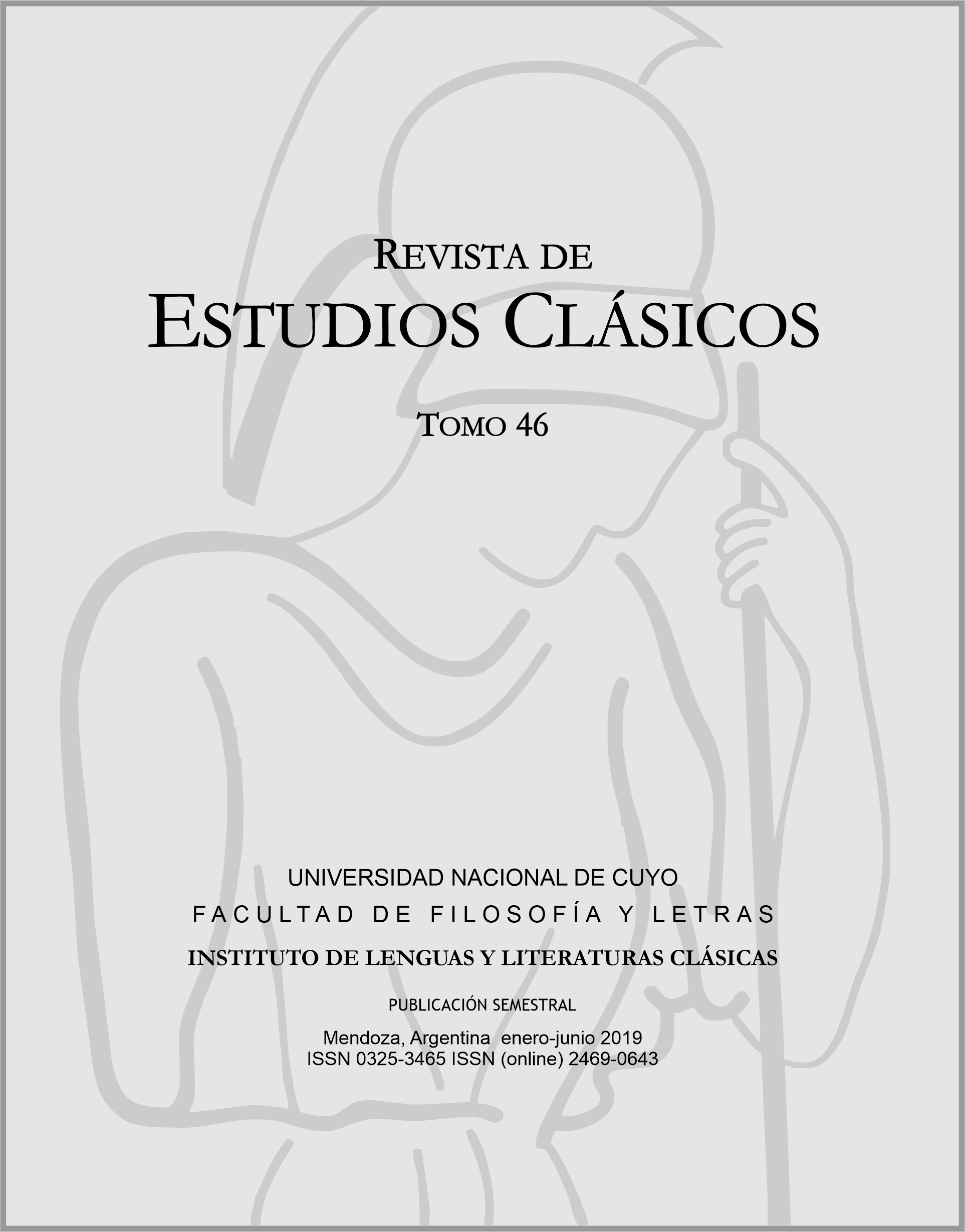El arco y la bestia: soledad, metamorfosis y deshumanización en Filoctetes de Sófocles
Keywords:
transformation, bow, apostrophe, middle, groundAbstract
Sophocles’ Philoctetes is the tragedy of a man driven to the limits of his
own human nature in a context of total abandonment. In this article, I
intend to show that the eponym hero of this tragedy suffers a
metamorphosis in which he abandons his human condition and
consciously assumes his own animality. To do this, I will focus on the
meaning that the bow and its loss have for the hero and, also, on the
apostrophes that express his new relationship with the surrounding
environment.
References
Alamillo, A. (trad.). (2006). Sófocles. Áyax. Madrid: Editorial Gredos.
Austin, N. (2011). Sophocles' Philoctetes and the Great Soul Robbery. Madison:
University of Wisconsin Press.
Belfiore, E. (1994). Xenía in Sophocles’ Philoctetes. The Classical Journal 89 (2).
113-129. Recuperado de https://www.jstor.org/stable/3297661
Berzins McCoy, M. (2013). Wounded Heroes: Vulnerability as a Virtue in Ancient
Greek Literature and Philosophy. New York: Oxford University Press.
Buxton, R. (2009). Forms of Astonishment: Greek Myths of Metamorphosis.
New York: Oxford University Press.
Coulon, V. y van Daele, M. (Ed.). (1928). Aristófanes. Aves en Aristophane, vol.
3. París: Les Belles Lettres.
Franklin Johnson, J. (2016). Acts of Compassion in Greek Tragic Drama.
Norman: University of Oklahoma Press.
Finley, M. I. (1979). The World of Odysseus. Dallas: Penguin Books.
Gallego, J. (2012). La democracia ateniense en el desierto de Lemnos: el
Filoctetes de Sófocles y la política del demos. Lógos y Arkhé. Buenos Aires:
Miño y Dávila Editores.
Irigoyen, R. (trad.). (2012) Esquilo. Prometeo Encadenado. Madrid: Penguin
Clásicos.
Jebb. R.C. (2004) Sophocles: Plays. Philoctetes. Bristol: Bristol Classical Press.
Korkohen, T. y Ruonakoski, E. (2017). Human and Animal in Ancient Greece:
Empathy and Encounter in Classical Literature. Londres: I.B. Tauris & Co.
Lestel, D. (2016). Second Course: The Ethics of the Carnivore. Eat This Book: A
Carnivore’s Manifesto (59-80). New York: Columbia University Press.
Recuperado de https://www.jstor.org/stable/10.7312/lest17296
Loraux, N. (1991). Tragic Ways of Killing a Woman. Cambridge: Harvard
University Press.
Martínez García, O. (trad.). (2016). Homero. Ilíada. Madrid: Alianza Editorial.
Medina, A. y López, J. (trad.). (1991). Eurípides. Hécuba. Madrid: Editorial
Gredos.
Nooter, S. (2012). When Heroes Sing: Sophocles and the Shifting Soundscape of
Tragedy. New York: Cambridge University Press.
Nussbaum, M. (2001). The Fragility of Goodness. Cambridge: Cambridge
University Press.
Pabón, J.M. (trad.). (1962). Homero. Odisea. Madrid: Editorial Gredos.
Pabón, J.M. y Fernández, M. (trad.). (2012). Platón. República. Madrid: Alianza
Editorial.
Payne, M. (2015). The Animal Part: Human and Other Animals in The Poetic
Imagination. Chicago: The University of Chicago Press.
Pearson, A.C. (ed.). (1971). Sophoclis Fabulae. Londres: Oxford Classical Texts.
Rodríguez, E. (2004). Animalizar a la víctima: Políxena en la Hécuba de
Eurípides. Veleia (21). 99-107. Recuperado de
http://www.ehu.eus/ojs/index.php/Veleia/article/view/3374
Sælid, I. Animals, Gods, and Humans: Changing Attitudes to Animals in Greek,
Roman and Early Christian Thought. (2006). New York: Routledge.
Santa Cruz, M. I. y Crespo, M. I. (trad.). (2009). Aristóteles, Política. Buenos
Aires: Editorial Losada.
Thumiger, C. (2014a) Animals in Tragedy. En The Oxford Handbook of Animals
in Classical Thought and Life (pp. 84-99). New York: Oxford University Press.
Thumiger, C. (2008) "ἀνάγκης ζεἐµατ’áἐµπεπτÏŽκαµεν: Greek Tragedy between
human and animal" en Leeds International Classical Studies 7. (3). 1-21.
Thumiger, C. (2014b) Metamorphosis: Human into Animals. En The Oxford
Handbook of Animals in Classical Thought and Life (pp. 384-413). New York:
Oxford University Press.
Whaley, P. (1960). The Role of the Bow in the Philoctetes of Sophocles. The
American Journal of Philology 81 (4). 408-414. Recuperado de
https://www.jstor.org/stable/292533
Downloads
How to Cite
Issue
Section
License
Aquellos autores/as que tengan publicaciones con esta revista, aceptan los términos siguientes:
- Los autores/as conservarán sus derechos de autor y garantizarán a la revista el derecho de primera publicación de su obra, el cuál estará simultáneamente sujeto a laLicencia Creative Commons Atribución-NoComercial-CompartirIgual 2.5 Argentina (CC BY-NC-SA 2.5 AR). (https://creativecommons.org/licenses/by-nc-sa/2.5/ar/)que permite a terceros compartir la obra siempre que se indique su autor y su primera publicación esta revista.
- Los autores/as podrán adoptar otros acuerdos de licencia no exclusiva de distribución de la versión de la obra publicada (p. ej.: depositarla en un archivo telemático institucional o publicarla en un volumen monográfico) siempre que se indique la publicación inicial en esta revista.
- Se permite y recomienda a los autores/as difundir su obra a través de Internet (p. ej.: en archivos telemáticos institucionales o en su página web) antes y durante el proceso de envío, lo cual puede producir intercambios interesantes y aumentar las citas de la obra publicada. (Véase El efecto del acceso abierto).


































